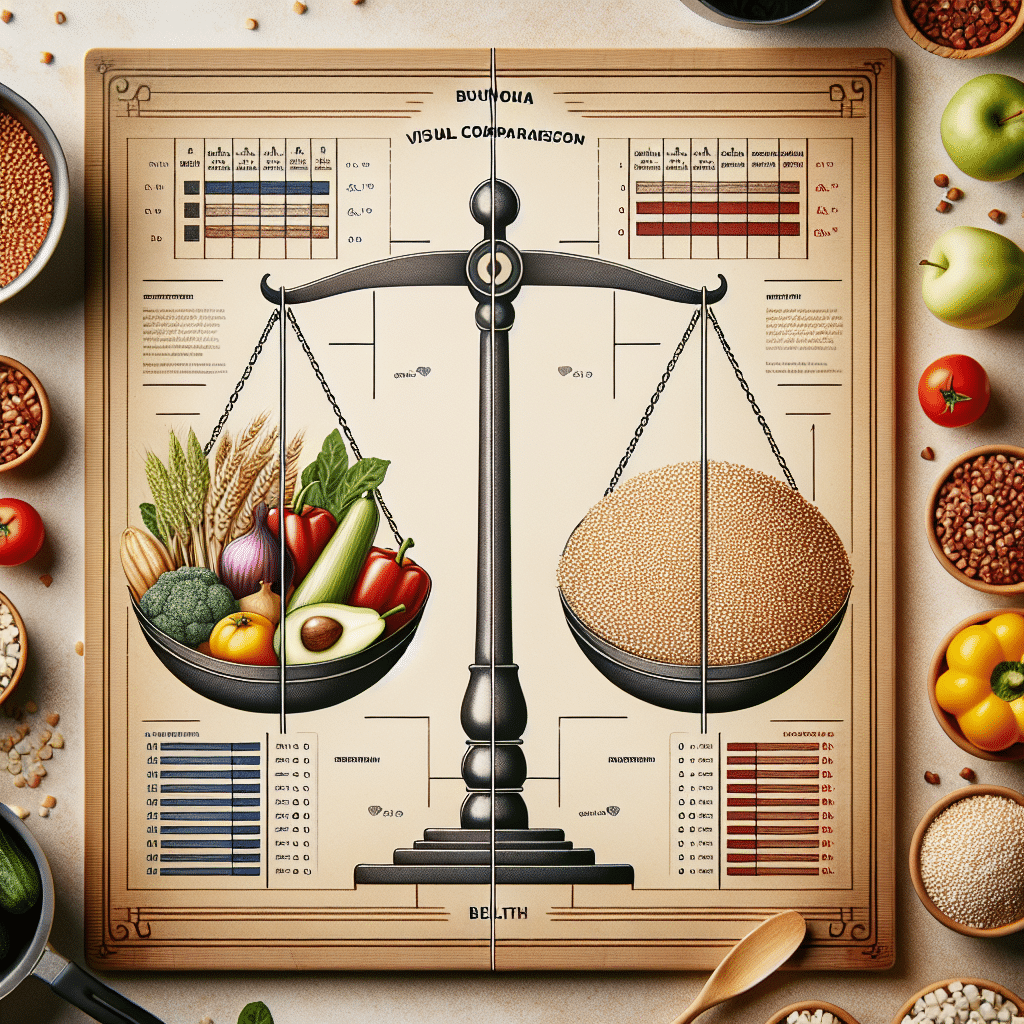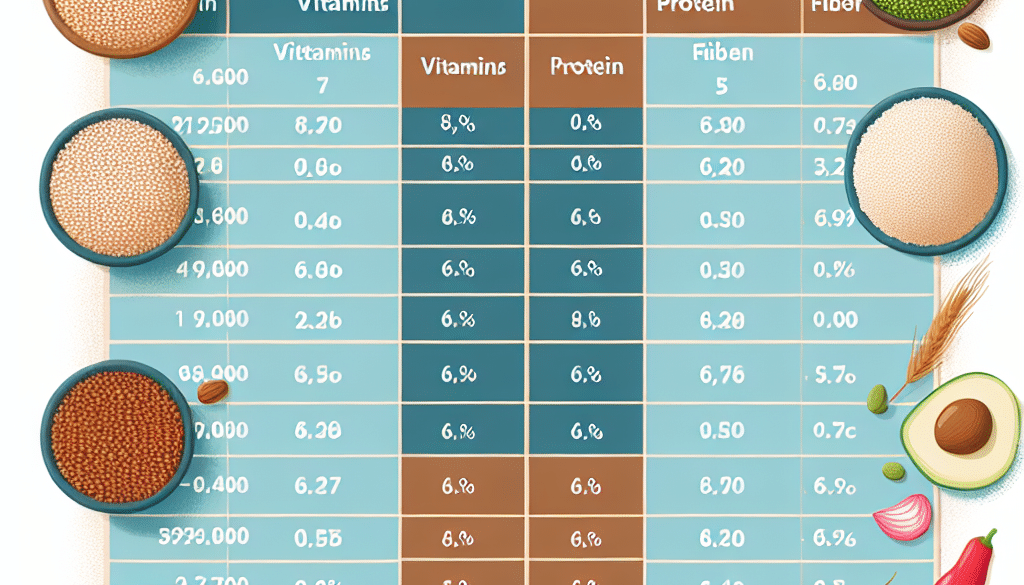Which Is Healthier Quinoa Or Buckwheat?
-
Table of Contents
Quinoa vs Buckwheat: A Comprehensive Health Comparison

When it comes to choosing healthy grains, quinoa and buckwheat are often at the top of the list. Both are praised for their nutritional benefits and versatility in the kitchen. But which one is truly healthier? In this article, we’ll delve into the nutritional profiles, health benefits, and culinary uses of quinoa and buckwheat to determine which grain might be the better choice for your diet.
Nutritional Profiles of Quinoa and Buckwheat
Understanding the nutritional content of quinoa and buckwheat is crucial to determining which is healthier. Here’s a breakdown of what each grain has to offer:
- Quinoa: Often referred to as a “superfood,” quinoa is a complete protein, meaning it contains all nine essential amino acids. It’s also high in fiber, magnesium, B vitamins, iron, potassium, calcium, phosphorus, vitamin E, and various beneficial antioxidants.
- Buckwheat: Despite its name, buckwheat is not related to wheat and is gluten-free. It’s rich in fiber and protein, though not a complete protein like quinoa. Buckwheat is also a good source of minerals such as magnesium, copper, and manganese, and contains a unique component called rutin, a powerful antioxidant.
Both grains are naturally gluten-free, making them excellent choices for those with celiac disease or gluten sensitivity.
Health Benefits of Quinoa and Buckwheat
Quinoa and buckwheat offer a range of health benefits. Let’s explore some of the most significant ones:
- Quinoa: The high fiber content in quinoa can help with digestion and may reduce the risk of chronic diseases such as heart disease and diabetes. Its complete protein status makes it particularly beneficial for vegetarians and vegans who need to ensure they’re getting all essential amino acids.
- Buckwheat: Buckwheat’s high levels of rutin contribute to its antioxidant capacity, which can help fight inflammation and lower the risk of various diseases. The fiber in buckwheat can also aid in digestive health and help manage blood sugar levels.
Both grains have low glycemic indexes, which means they have a slow and steady impact on blood sugar levels, making them suitable for individuals with diabetes or those looking to maintain stable energy levels throughout the day.
Culinary Uses and Versatility
Quinoa and buckwheat are both incredibly versatile in the kitchen. Here are some ways to incorporate them into your meals:
- Quinoa: Quinoa can be used as a base for salads, as a substitute for rice or pasta, or even as a breakfast cereal. It can also be used to make veggie burgers, soups, and stews.
- Buckwheat: Buckwheat flour is commonly used to make pancakes, noodles (like Japanese soba), and crepes. Whole buckwheat groats can be used similarly to quinoa or made into porridge.
Both grains can be easily incorporated into a variety of dishes, making them a staple in any health-conscious kitchen.
Which Is Healthier: Quinoa or Buckwheat?
Choosing between quinoa and buckwheat ultimately depends on your dietary needs and preferences. Quinoa’s status as a complete protein may make it a better choice for those who do not consume animal products. On the other hand, buckwheat’s unique antioxidant properties and its contribution to heart health may appeal to those focused on cardiovascular wellness.
It’s also worth considering the environmental impact of these grains. Quinoa is primarily grown in South America and has faced criticism for its impact on local economies and ecosystems. Buckwheat is more widely grown and may have a smaller carbon footprint depending on where it’s sourced.
In conclusion, both quinoa and buckwheat are nutritious options that can play a beneficial role in a balanced diet. Rather than choosing one over the other, incorporating both grains into your meals can provide a wider range of nutrients and health benefits.
Conclusion
Quinoa and buckwheat are both excellent additions to a healthy diet, each with its unique nutritional benefits. Quinoa offers a complete protein source for plant-based diets, while buckwheat provides distinctive antioxidants that support heart health. The choice between quinoa and buckwheat should be based on individual nutritional needs, dietary preferences, and environmental considerations. Including both grains in your diet can enhance your nutritional intake and contribute to overall well-being.
Discover ETprotein’s High-Quality Protein Products
If you’re looking to supplement your diet with additional protein, ETprotein offers a range of organic bulk vegan proteins that can complement your intake of healthy grains like quinoa and buckwheat. Their products are non-GMO, allergen-free, and feature a neutral taste, making them an excellent choice for various dietary needs.
ETprotein’s offerings include Organic rice protein, pea protein, and a variety of seed proteins, all of which can be easily added to smoothies, baked goods, and other recipes for an extra protein boost. Additionally, their L-(+)-Ergothioneine (EGT) products provide a high-purity antioxidant that can support your health in numerous ways.
Whether you’re a distributor, trader, or manufacturer in the food and beverage or nutraceutical industry, ETprotein can meet your protein needs with their extensive product range and commitment to quality.
About ETprotein:
ETprotein, a reputable protein and L-(+)-Ergothioneine (EGT) Chinese factory manufacturer and supplier, is renowned for producing, stocking, exporting, and delivering the highest quality organic bulk vegan proteins and L-(+)-Ergothioneine. They include Organic rice protein, clear rice protein, pea protein, clear pea protein, watermelon seed protein, pumpkin seed protein, sunflower seed protein, mung bean protein, peanut protein, and L-(+)-Ergothioneine EGT Pharmaceutical grade, L-(+)-Ergothioneine EGT food grade, L-(+)-Ergothioneine EGT cosmetic grade, L-(+)-Ergothioneine EGT reference grade and L-(+)-Ergothioneine EGT standard. Their offerings, characterized by a neutral taste, non-GMO, allergen-free attributes, with L-(+)-Ergothioneine purity over 98%, 99%, cater to a diverse range of industries. They serve nutraceutical, pharmaceutical, cosmeceutical, veterinary, as well as food and beverage finished product distributors, traders, and manufacturers across Europe, USA, Canada, Australia, Thailand, Japan, Korea, Brazil, and Chile, among others.
ETprotein specialization includes exporting and delivering tailor-made protein powder and finished nutritional supplements. Their extensive product range covers sectors like Food and Beverage, Sports Nutrition, Weight Management, Dietary Supplements, Health and Wellness Products, and Infant Formula, ensuring comprehensive solutions to meet all your protein needs.
As a trusted company by leading global food and beverage brands and Fortune 500 companies, ETprotein reinforces China’s reputation in the global arena. For more information or to sample their products, please contact them and email sales(at)ETprotein.com today.














